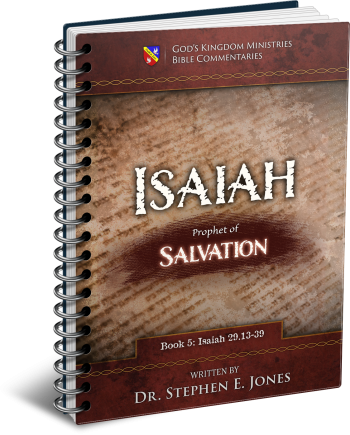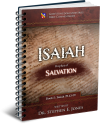Latest Posts
View the latest posts in an easy-to-read list format, with filtering options.

Isaiah is the prophet of Salvation. He is also known as the truly "Universalist" prophet, by which is meant that He makes it clear that salvation is extended equally to all nations and not just to Israel. He lived to see the fall of Israel and the deportation of the Israelites to Assyria, and he prophesied of their "return" to God (through repentance). He is truly a "major prophet" whose prophecies greatly influenced the Apostle Paul in the New Testament.
Category - Bible Commentaries

Isaiah 36:11 says,
11 Then Eliakim and Shebna and Joah said to Rabshakeh, “Speak now to your servants in Aramaic, for we understand it; and do not speak with us in Judean [Yehudeth] in the hearing of the people who are on the wall.”
Negotiations are usually done privately so that the negotiators can more openly speak their mind. But Rabshakeh knew Yehudeth, i.e., Hebrew, even as Judah’s negotiators knew the Babylonian language of Aramaic. A century later, the people of Judah would all learn Aramaic and even adopt their letters of the alphabet.
Rabshakeh’s response is given in Isaiah 36:12,
12 But Rabshakeh said, “Has my master sent me only to your master and to you to speak these words, and not to the men who sit on the wall, doomed to eat their own dung and drink their own urine with you?”
Certainly, everyone in Jerusalem had a stake in these negotiations. The outcome could mean life or death for them. Yet each side was thinking of its own advantage and cared little about protocol itself.
Isaiah 36:13-20 says,
13 Then Rabshakeh stood and cried with a loud voice in Judean and said, “Hear the words of the great king, the king of Assyria. 14 Thus says the king, ‘Do not let Hezekiah deceive you, for he will not be able to deliver you; 15 nor let Hezekiah make you trust in the Lord saying, “The Lord will surely deliver us, this city will not be given into the hand of the king of Assyria.” 16 Do not listen to Hezekiah,’ for thus says the king of Assyria, ‘Make your peace with me and come out to me, and eat each of his vine and each of his fig tree and drink each of the waters of his own cistern, 17 until I come and take you away to a land like your own land, a land of grain and new wine, a land of bread and vineyards. 18 Beware that Hezekiah does not mislead you, saying, “the Lord will deliver us,” Has any one of the gods of the nations delivered his land from the hand of the king of Assyria? 19 Where are the gods of Hamath and Arpad? Where the gods of Sepharvaim? And when have they delivered Samaria from my hand? 20 Who among all the gods of these lands have delivered their land from my hand, that the Lord would deliver Jerusalem from my hand?’”
It was common for kings to encourage their people to put their trust in the gods of their nations. But the gods of Hamath, Arpad, Sepharvaim, and Samaria had not saved them from the Assyrians. This was plain for all to see. So why should Jerusalem be any different?
To submit to Assyria was to agree to go into exile “to a land like your own land,” thereby joining the Israelites and the captives of Judah who had already gone before them. But if they had done so, they would have suffered the same fate as Israel, which had been divorced from God and had been sent out of His house (Deut. 24:1, KJV; Jer. 3:8; Hosea 2:2).
God, however, needed a remnant of Judah through which the Messiah would be born 700 years later. In fact, because Hezekiah himself was of the anointed lineage from which the Messiah was to be born, it was necessary for Hezekiah to survive. He had no children at that point in his life, and at the moment his chances of survival were extremely bleak.
The men on the walls heard the terms of the king of Assyria, but Hezekiah had given them orders to make no response. Isaiah 36:21 says,
21 But they were silent and answered him not a word; for the king’s commandment was, “Do not answer him.”
The general principle to learn from this is that we should listen but respond only to the voice of God. His voice creates faith, while the voices of men create fear or, at best, positive thinking.
Isaiah 36:22 says,
22 Then Eliakim the son of Hilkiah, who was over the household, and Shebna the scribe, and Joah the son of Asaph, the recorder, came to Hezekiah with their clothes torn and told him the words of Rabshakeh.
No doubt they were devastated by Rabshakeh’s demands. But why were their clothes torn? It was common for righteous men to tear their clothes when they would hear blasphemous words. Rabshakeh had just blasphemed the God of Hezekiah, suggesting that Yahweh was unable to save him and the city from the Assyrian threat. Rabshakeh had put Yahweh into the same category as all of the false gods of the nations.
Isaiah 37:1, 2 continues,
1 And when King Hezekiah heard it, he tore his clothes, covered himself with sackcloth, and entered the house of the Lord. 2 Then he sent Eliakim who was over the household with Shebna the scribe and the elders of the priests, covered with sackcloth, to Isaiah the prophet, the son of Amoz.
Hezekiah went to the temple in sackcloth, a sign of repentance and mourning, and the priests then followed his example. A delegation was then sent to Isaiah the prophet to appeal to God and to hear the word of the Lord.
Isaiah 37:3-5 records their appeal:
3 They said to him, “Thus says Hezekiah, ‘This day is a day of distress, rebuke, and rejection [ne’atsah, “scorn, blasphemy”]; for children have come to birth, and there is no strength to deliver. 4 Perhaps the Lord your God will hear the words of Rabshakeh, whom his master the king of Assyria has sent to reproach the living God and will rebuke the words which the Lord your God has heard. Therefore, offer a prayer for the remnant that is left’.” 5 So the servants of King Hezekiah came to Isaiah.
Hezekiah understood that this was a day of blasphemy (ne’atsah), as did Eliakim, Shebna, and Joah when they tore their clothes. It was one thing to blaspheme false gods which are really no gods at all. It was another thing to blaspheme Yahweh and to charge Him with weakness.
In the background of this situation, we must note that Hezekiah’s name means “Strength of Yahweh,” and the name of Isaiah’s father, Amoz, means “strong.” Hence, to charge Hezekiah’s God with weakness was to deny the testimony inherent in the name of King Hezekiah. Would the king then live up to his name, or would he agree with the king of Assyria?
Hezekiah’s message said, “children have come to birth, and there is no strength to deliver.” This was a saying that referred to a baby that was stuck in the birth canal. The promise of a baby was failing at the last minute. It meant that they were in a dilemma and what was started was unable to be completed. In this case, it appeared that the Dominion Mandate, which was the promise given to Judah in Gen. 49:10, was in danger of failing.
Isaiah 37:6, 7 gives Isaiah’s response, saying,
6 Isaiah said to them, “Thus you shall say to your master, ‘Thus says the Lord, Do not be afraid because of the words that you have heard, with which the servants of the king of Assyria have blasphemed Me. 7 Behold, I will put a spirit in him so that he will hear a rumor [shemuw’ah, “report, news, announcement”] and return to his own land. And I will make him fall by the sword in his own land’.”
The king had successfully completed his siege of Lachish (Isaiah 36:2) and had moved north to attack Libnah. Isaiah 37:8 says,
8 Then Rabshakeh returned [to report to King Sennacherib] and found the king of Assyria fighting against Libnah, for he had heard that the king had left Lachish.
Hence, when the Assyrian army was destroyed overnight by the angel, the survivors sent a message to the king at Libnah. Rabshakeh may have been at Libnah as well. We do not know how long it was between the negotiation and the destruction of the Assyrian army, for Scripture is unclear about the timing of that event.
But when the king and Rabshakeh heard of the disaster that had befallen his troops at Jerusalem, the king quickly ended the siege of Libnah to “return to his own land,” where his sons killed him as he worshiped in his temple (Isaiah 37:37, 38).
I do not know why the Hebrew word shemuw’ah was translated “rumor,” which today implies an unsubstantiated report, unless perhaps the messenger was too frightened to tell the king of Assyria the full truth. He was probably at a loss to explain the death of 185,000 troops overnight, so he may have reported something like: “Your majesty, your army mysteriously died overnight, and I have no idea how this happened. Please don’t kill the messenger of bad news!”
The feminine past participle of the word shemuw’ah is shamam, “to be desolate, be appalled, stun, stupefy.” No doubt this describes the reaction of the King of Assyria. This may explain the “spirit” that God put in him that caused him to “hear a shemuw’ah.”
Apparently, God sent him a “spirit of stupor” (Rom. 11:8), similar to when He sent “a deceiving spirit” to deceive the prophets of Ahab (1 Kings 22:20, 21, 22, 23).